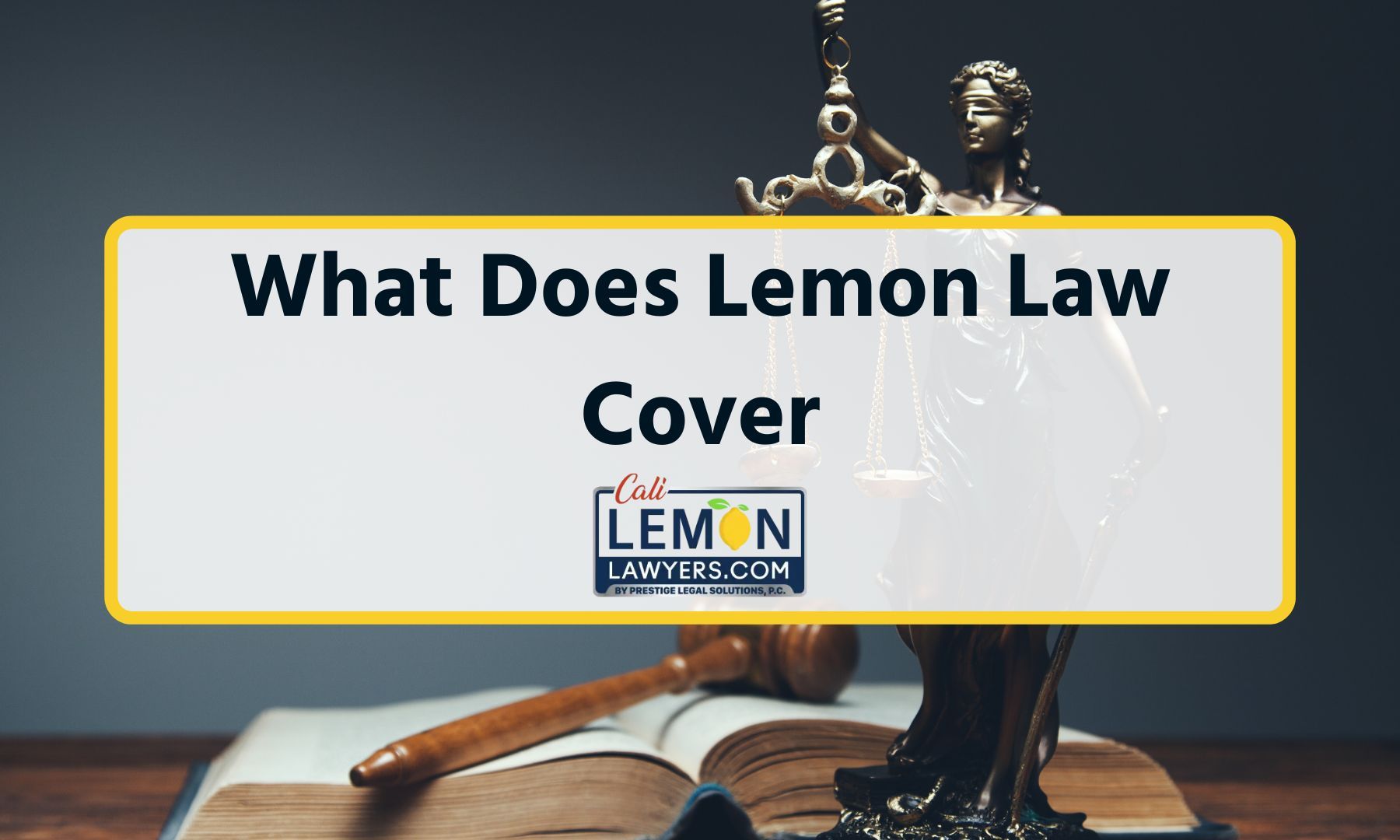
What Does Lemon Law Cover: A Comprehensive Guide for Vehicle Owners
What does lemon law cover? Simply put, lemon laws encompass rights for buyers of new and used vehicles with recurring, unresolved defects. Aimed at ensuring manufacturers uphold their warranties, these laws enable consumers to seek solutions such as repairs, replacements, or refunds.
Get free answers to your Lemon Law questions from an experienced California Lemon Law attorney. Call now for a free consultation and find out what the maximum compensation for your lemon looks like.
This guide will help decode how lemon laws can protect your investment, highlight covered vehicles and defects, and explain the steps to take if your set of wheels turns sour.
Lemon Law Summary

- Lemon Law protects consumers by requiring manufacturers to repair, replace, or refund motor vehicles that have persistent defects, ensuring protection for vehicles under a manufacturer’s express warranty including new, used, and leased vehicles.
- The Lemon Law enforces express and implied warranties that guarantee the vehicle’s performance and functionality, with the implied warranty of merchantability ensuring the vehicle meets the ordinary standards expected by a reasonable buyer.
- The process of filing a lemon law claim involves documenting the defect, notifying the manufacturer, and potentially seeking legal assistance if the manufacturer fails to address the issue after a reasonable number of attempts, with the goal of obtaining a refund or replacement vehicle.
Exploring the Scope of Lemon Law
Lemon Law serves as a legal shield for consumers who unintentionally end up with defective motor vehicles, including any motor vehicle that falls under this category. It mandates manufacturers to rectify, replace, or reimburse the purchase if the vehicle remains unrepairable after a reasonable number of attempts. The objective of this law is simple yet significant; it provides protection and options for consumers who encounter persistent defects in a vehicle despite repeated repair attempts.
Lemon laws cover a range of motor vehicles, both new and used. The law applies as long as the vehicle comes with a manufacturer’s express warranty. This includes leased vehicles, giving a wide scope of protection to consumers. The law also extends its coverage to used cars under the used car lemon law, depending on the state laws in place.

Warranties have a significant role in lemon law. These are agreements between the consumer and the manufacturer that the vehicle will perform as advertised. There are two types of warranties – express and implied. Express warranties, such as a manufacturer’s express warranty, are explicit commitments by the manufacturer about the performance of the vehicle. Implied warranties are unspoken, unwritten guarantees that the vehicle will function as expected.
State lemon laws vary and are designed to provide consumer protection. For example, Connecticut consumers are allowed a reasonable number of repair attempts before they can claim under the lemon law. The Connecticut Attorney General’s office can provide guidance on the process, including the filing fee, if any.
Lemon Law and Warranties

Lemon laws originated to enforce both express and implied warranties. An express warranty is a particular promise about a product, conveyed either orally or in writing. This could be in the form of a sales agreement or an advertising material.
On the other hand, implied warranties of merchantability, for example, apply to the sale and purchase of motor vehicles and are a part of state lemon laws. This warranty essentially means that the vehicle is expected to:
- perform as any reasonable buyer would expect it to
- be free from defects that would impair its use or value
- be fit for the ordinary purposes for which such goods are used
The implied warranty of fitness for a particular purpose is another aspect that lemon law covers. It’s an implicit commitment that the product is suitable for the specific purpose for which the seller, upon whom the consumer depends for their expertise or judgment, is aware that the consumer will utilize it.
These warranties are key in determining if a vehicle is classified as a lemon. If a vehicle fails to meet the conditions of these warranties, the consumer can seek a refund or replacement vehicle, illustrating the protective power of lemon laws.
Navigating the Lemon Law Process
Filing a lemon law claim might appear complicated, but it generally involves documenting the defect, notifying the manufacturer, and seeking legal assistance if necessary. The first step is to document the defect in detail. This includes noting down when the defect first appeared, the nature of the defect, and the effect it has on the vehicle’s operation.
After documenting the defect, the next step is to notify the manufacturer. This usually involves sending a letter to the manufacturer detailing the defect and requesting a repair. It’s important to keep a copy of this letter as proof of the notification.
In most cases, the manufacturer is given a reasonable number of attempts to repair the defect. If the defect remains unrectified after these attempts, the consumer can initiate a lemon law claim. The standard procedures for initiating a Lemon Law claim involve submitting an application online through the ‘File a Complaint’ system and filing an arbitration claim, which typically does not require a filing fee.

Sometimes, consumers may face challenges with the manufacturer, or the case may proceed to court. In such situations, legal representation can be beneficial. Legal representation can help navigate the complexities of lemon laws and ensure that the consumer’s rights are protected.
The final aim of the process is to secure a refund or a replacement vehicle, providing an effective resolution for consumers who purchase a defective vehicle.
Consumer Rights and Manufacturer Obligations

Under the consumer lemon law, consumers possess a defined set of rights. They are entitled to have their vehicles repaired or replaced if they do not meet the manufacturer’s express warranty and have significant defects that impact their use, safety, or value.
For a consumer to be eligible for protection under the lemon law, the following conditions must be met:
- The defects must have manifested within the initial two years after the original owner took possession or within the first 24,000 miles on the odometer, whichever occurs first.
- The attempts to rectify the issues must also have been made within this timeframe.
- The defects remained unresolved even after a reasonable number of repair attempts.
Manufacturers also bear responsibilities under the lemon law. They are required to rectify any defects in their products, replace a defective product or refund a customer’s money. In other words, if a vehicle is found to be a lemon, the manufacturer can’t simply wash their hands of it.
Manufacturers are also expected to:
- Participate in the informal arbitration process
- Offer a reasonable chance for defect rectification through multiple attempts
- Acknowledge the consumer’s notification within 30 days
- Maintain a comprehensive record of the defects and repair efforts.
Failure to adhere to these obligations can result in serious repercussions for manufacturers. They may be mandated to repurchase or replace the defective vehicle and issue a refund to the consumer. This underlines the critical role of the lemon law in holding manufacturers accountable and safeguarding consumer rights.
Additional Protections Under Federal Law
Apart from state laws, federal legislation also provides protections for consumers. The Magnuson-Moss Warranty Act is a federal statute that regulates warranties for consumer products. It enhances consumer protection by mandating that warrantors of consumer products furnish comprehensive details about warranty coverage and provide fair and efficient remedies in the event of a warranty breach.
Sellers under the Magnuson-Moss Warranty Act are required to:
- Uphold consumer rights under implied warranties
- Request consumers to only notify them of defects
- Endeavor to provide repair, replacement, or refund when feasible
Violation of this Act can result in severe penalties for manufacturers, including civil penalties of up to $46,517 per violation in federal court.
It’s important to note, however, that the Magnuson-Moss Warranty Act does not override or take precedence over any rights a consumer may have under state law. It simply offers an additional layer of protection for consumers, ensuring they are not left in the lurch when they purchase a defective vehicle.
When Lemon Law Doesn’t Apply
Although Lemon Law provides considerable protection, it is not applicable in all scenarios, like when a vehicle is sold ‘as is’. In this case, the vehicle is being sold in its current condition, with all faults, and no warranties are provided. Therefore, the buyer acknowledges the vehicle’s existing issues, and lemon laws are not activated to provide protection.
The protection offered by lemon laws also has exceptions when it comes to pre-owned vehicles. If a pre-owned vehicle is sold without a specified written warranty, lemon law protections may not apply.
However, if a dealership offers a warranty for a pre-owned vehicle, it may still fall under the coverage of Lemon Law.
The nature of the defect also plays a role in the applicability of the Lemon Law. The law defines a substantial defect as a condition that notably hinders the functionality, worth, or safety of the vehicle. Examples of substantial defects include:
- Engine failure
- Transmission problems
- Brake failure
- Steering issues
Minor defects that do not significantly impair the performance or safety of the vehicle may not qualify for lemon law protection.
Lastly, high mileage can impact a vehicle’s eligibility for Lemon Law protection. Vehicles with substantial usage, usually exceeding 125,000 miles, might be exempt from lemon law protection as the law commonly assumes that the warranty does not cover such vehicles.
Summary

In conclusion, Lemon Law serves as a powerful tool for consumers facing the unfortunate situation of owning a defective vehicle. It holds manufacturers accountable, ensuring they stand by their warranty commitments, and provides consumers with the right to a functioning vehicle.
Despite certain exceptions, the protections offered by the Lemon Law, combined with additional protections under federal law, create a safety net for consumers navigating the complex world of vehicle ownership.
Contact us for a free consultation on your Lemon Law Car.
Frequently Asked Questions
How do I file a lemon law claim in California?
To file a lemon law claim in California, you should submit an application online through the “File a complaint” system on the Department of Consumer Protection‘s website.
What is a lemon law buyback?
A Lemon Law buyback refers to a vehicle that has been returned to the manufacturer after being declared a lemon, or the process of a dealer accepting the return and refunding the consumer. This is part of a consumer protection law designed to help owners of defective vehicles.
What is the Magnuson-Moss Warranty Act?
The Magnuson-Moss Warranty Act is a federal statute that provides additional protection to consumers by regulating warranties for consumer products.
When does Lemon Law not apply?
Lemon Law may not apply when a vehicle is sold ‘as is’, when a pre-owned vehicle is sold without a specified written warranty, when the defect is not substantial, or when the vehicle has high mileage.
